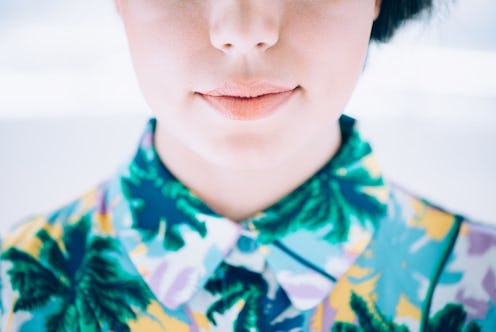Style
These Unexpected Things Could Be Aggravating Your Rosacea & They're SO Everyday

The causes of rosacea are infuriatingly elusive. The skin condition, which typically manifests as facial redness, visible blood vessels, or little red pustules, has been attributed to a whole host of causes, from abnormalities in the the blood vessels to an increase of microscopic mites on the surface of the skin. Although the exact root of the disease remains uncertain, both doctors and sufferers alike have identified numerous unexpected factors that could be triggering your rosacea.
The NHS offers an exhaustive (and exhausting) list of theories surrounding the origins of rosacea. It might be a fault in the blood vessels, as mentioned above, or increased levels of helicobacter pylori bacteria in the digestive system. Or it could be down to the increased population of demodex folliculorum, or microscopic mites, observed on the skin of rosacea sufferers (don't freak out — everyone has some).
But instead of bogging yourself down in uncertainty, a good solution might be to focus instead on the frequently identified lifestyle factors that could be triggering your flare-ups. Changes as small as air-drying your hair, limiting your coffee consumption, or slapping on some sunscreen could allow you to get your rosacea completely under control. Just keep reading for calmer skin!
1Morning Cup Of Coffee
The NHS lists caffeine from coffee, tea, and cola as a potential rosacea trigger. Others have argued, however, that the caffeine-rosacea association is a myth; the National Rosacea Society, for example, suggests that it's actually the heat from coffee and tea that causes flare-ups. Like many aspects of rosacea, the exact correlation is frustratingly ambiguous, and you might just have to adopt a suck it and see approach.
2Evening Glass Of Wine
A study released last year by the American Academy of Dermatology stated that "increased consumption of alcohol, particularly white wine and liquor, is associated with a higher risk of rosacea in women." Though the study didn't unpack why this connection exists, the researchers guessed that "alcohol’s weakening of the immune system and widening of the blood vessels could contribute to the redness and flushing that occur when one develops the condition." Confusingly, the study also reported that red wine isn't likely to cause you to develop rosacea, but it is likely to worsen the condition for existing sufferers.
3Eating Spicy Food
Dermatologist Julia T. Hunter told SELF that "eating spicy foods — or foods that your gut may be sensitive to — can all trigger flare-ups." According to the magazine, spicy foods can increase facial redness by encouraging the blood vessels in your face to dilate — so next time you're at Nando's, try switching your extra hot chicken for lemon and herb.
4Workout Routine
According to the NHS, "strenuous exercise" can aggravate rosacea. They recommend switching up your exercise routine from high-intensity to low-intensity workouts — so runners and gym-goers might want to switch out some of their more intense sessions with walking, swimming, or Pilates.
5High Stress Levels
Another trigger the NHS warns against is stress — which, easier said than done, I know. But stress can wreak havoc on our bodies in innumerable ways, including worsening rosacea, so it's worth trying out relaxation techniques like meditation or yoga, doing regular (low-intensity!) exercise, or speaking to your GP if you're finding it difficult to manage your stress levels.
6Dairy Consumption
This is a cruel list, I know, but it turns out dairy — the greatest food group, IMO — could be exacerbating your rosacea. Beauty blogger and British Skin Foundation ambassador Talonted Lex writes on her blog about cutting out dairy, "I did notice a big change in my skin and I notice straight away if I treat myself to some cheese or a delicious creamy pudding." If you suspect dairy might be triggering your rosacea, try limiting your consumption to see if it has any effect.
7Blow-Drying Your Hair
Talonted Lex also says that blow-drying her hair can cause a flare-up; she writes, "Heat around my face triggers an instant flare up so I try to leave my hair to dry naturally as often as I can." For similar reasons, you might also want to avoid hot baths, saunas, and steam rooms.
8Thick Moisturisers
Dermatologist Dr Stefanie Williams told Red that many rosacea sufferers layer on thick moisturisers because their skin feels sore and dry. "But it’s actually the micro inflammation caused by the condition that makes it feel that way, rather than true dryness, and rich creams can make matters worse, causing more inflamed lesions," she told the magazine. If you're struggling to find a suitable replacement, look to this handy list of the best moisturisers for rosacea for inspiration.
9Sitting In The Sun
The NHS calls sunlight "the most commonly reported trigger of rosacea," and encourages daily use of a high SPF, regardless of the weather (yes, that means in the North too.) Wearing SPF every day is a pretty great habit for everyone to get into, even those who aren't dealing with rosacea — so slap it on and reap the flare-up soothing, skin damage-preventing benefits.
As undeniably irritating as it is, rosacea doesn't have to be a cause for despair. Take a trip to your GP, try out a few of these lifestyle tweaks, and do your utmost not to stress about your skin. A quick reminder: rosacea or no, you're absolutely bloody beautiful.